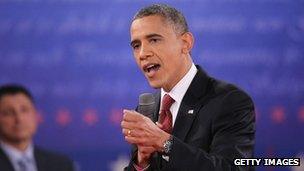Barack Obama did what he had to do
- Published
- comments

The town hall format changed the physicality of the debate with the candidates literally face-to-face
The absent warrior has returned. President Barack Obama redeemed himself.
This was a different format to the first debate, and it could have been a different president on stage. Undecided New York voters asked the questions and got strong, clear statements of policy from both candidates.
It is not so much that Mr Obama won, as that he didn't lose this time. He did what he had to, and perhaps some more. He was confident, combative and strong. Supporters will feel that he's back.
Mitt Romney's supporters won't be disappointed either. The Republican challenger put in a solid performance, nearly as good as last time, but he hadn't raised his game, and didn't have the stage to himself this time.
Many of the debating points we have heard scores of times before - Mr Romney managed to say that he knew how to run a business three times in one answer. But the body language was fascinating. These are two highly successful men, used to winning, used to getting the last word, used to a bit of respect.
At one stage early on, they almost squared off against each other, uncomfortably close, invading each other's personal space, hands raised in a gesture that says "stop - I'm talking".
After this awkward confrontation they backed off a little, mostly staying perched on their uncomfortable stool while the other man strolled and spoke.
But the passion repeatedly flared as they talked over each other.
The 11 questions asked by the audience ranged widely from gun control to Libya to immigration but the main focus was on the economy.
The most dramatic clash was over Libya, and the murder of the US ambassador and three other Americans. Mr Romney said Mr Obama flew off campaigning the next day.
Mr Obama accused Mr Romney of politicising the debate and said it was offensive to suggest he didn't care, and scoring political points on the issue was not the act of a potential commander-in-chief.
Then the most curious spat of the night as Mr Romney insisted Mr Obama hadn't called it terrorism, while Mr Obama and the moderator Candy Crowley insisted that he had.
In fact, Mr Obama had used the term "act of terror" in a loose way the day after the attack, while also suggesting it was the result of the anti-Islamic videos.
Republicans insist this is a fruitful area of attack, although it leaves me slightly mystified why they think this is so important.
The American media now accept the idea that this attack had nothing to do with the video.
Remember that everyone at the time, even reporters on the scene, thought it did. The distinction between an attack by al-Qaeda and an attack by enraged Islamic militants seems a little naïve and artificial. But there is no doubt the moderator came down on Mr Obama's side over the issue.
Conservatives may be annoyed by this debate - it appeared Mr Romney was cut off repeatedly when demanding the last word and some questions - on women's rights, immigration and gun control - could be said to favour Mr Obama, although the right feels passionately about those issues too.
All in all, this was a reminder of how rare that first debate was. It produced a clear winner and a clear loser. Because of that it mattered politically.
I suspect our judgment on this is more finely balanced, more like a theatre review. What Team Obama would have dreaded was anything that contributed to a narrative of decline and defeat.
This probably stopped the rot, will halt any panic. But the race is likely to remain unpredictably tight.